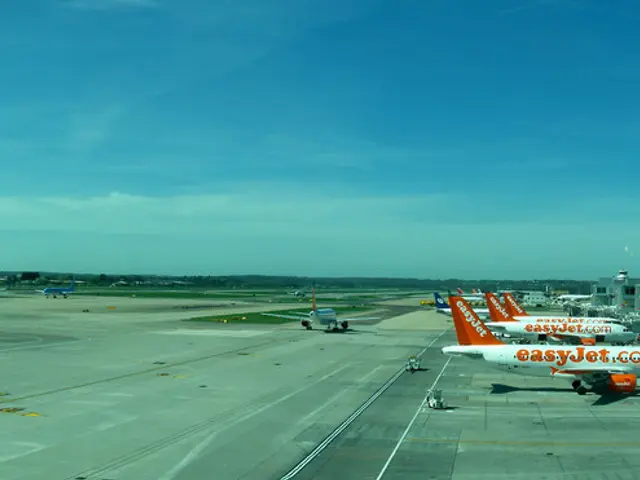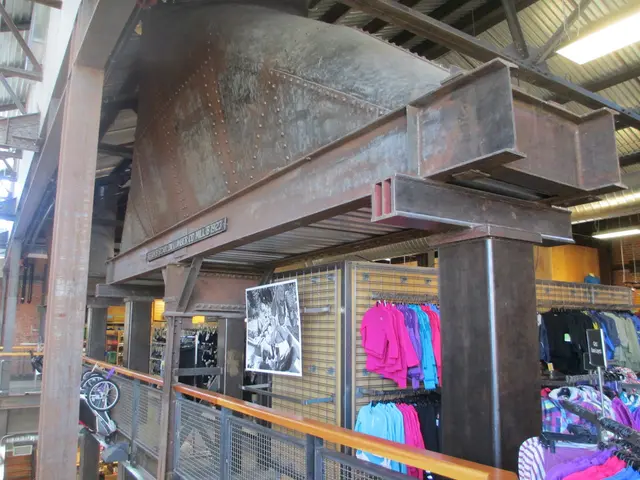Bridge closing for heavy goods transport on Cardinal-Frings-Bridge: detour via Flehe Marode Rhine bridges; estimated duration before traffic congestion escalates.
The Rhine is our lifeline, and a fully operational, heavy-duty bridge at the Neuss-Düsseldorf harbor location is bloody essential, according to Steinmetz, who advocates for a swift and practical solution.
Stephan Huth, head of the construction department at Landesbetrieb Straßenbau Nordrhein-Westfalen (Straßen.NRW), explains that they were forced to halt operations due to the damage. The repair work on the bridge commenced in August, and a parallel bridge inspection was conducted. Severe damage to the bridge supports was discovered, necessitating reduced load capacities and reduced speeds (30 km/h) temporarily.
Huth also revealed that they maintain regular communication with Autobahn GmbH, responsible for maintaining and constructing the Fleher Bridge, and Düsseldorf city officials. The Düsseldorf city administration declared that the elevated road on B7 in Heerdt can only accommodate vehicles up to 30 tons since March 2020, with the middle and left lanes also barred for vehicles over 3.5 tons in both directions. A public consultation on the future of the elevated road recently concluded, with a prospective tunnel construction at that location under consideration.
Tensions surrounding traffic between Neuss and Düsseldorf are escalating, and it is expected to worsen after the autumn holidays. The officially signposted detour for heavy goods traffic from Cardinal Frings Bridge leads over the Fleher Bridge on the A46 at the Uedesheim junction. Huth notes that while traffic disruptions in the wider area due to the south bridge's load restrictions cannot be avoided, the goal is to keep them to a minimum.
The IHK is critical of the increased distance and time-consuming detours between the Neuss and Düsseldorf harbors, stating it results in more fuel usage, increased vehicle miles, increased manpower, and increased costs for freight forwarders. "And this at a time when personnel shortages are severe and great efforts are being made for climate protection," Steinmetz highlights.
Mike Heeb of GTL - Neuss Getränke Transport & Logistik states: "The closure of the south bridge results in significant detours, delays, and fewer clients for inner-city traffic. In the harbor, for example, we can hardly accept any more orders - at least not at the old prices. For customers based there, we have to allocate two additional hours for travel, which is not a solution." Heeb adds that the situation negatively impacts not only heavy traffic but also car drivers, who must increasingly cope with congestion or find detours to avoid it.
Huth from Straßen.NRW asserts that sealing work in the direction of Düsseldorf should be completed by the end of the year, followed by opposite direction work in the new year. Then, work under the bridge can commence, which should not impact traffic flow. Afterwards, the new closure can be lifted. Huth mentions that closures should be avoided around Neuss for the Landesgartenschau 2026, although the current work is required to prevent a complete closure. As the Flehe Bridge itself is in a state of disrepair with upcoming new construction, whether it can handle the additional detour traffic remains to be seen.
"The situation is desperate. The crumbling and often neglected infrastructure is no longer sustainable without pragmatism, determination, and action. Infrastructure must be prioritized. Without it, nothing moves," says Steinmetz. The IHK is organizing a bridge crisis talk to discuss the current situation and immediate solutions.
Unfortunately, there is not enough information available about the current status or future plans for the repair and reconstruction of the Neuss-Düsseldorf harbor bridges, including the Rhine bridge and the Fleher Bridge. Bridge maintenance and repairs are crucial for ensuring transportation networks' safety and efficiency. Delays in bridge repairs can lead to substantial traffic congestion and logistical challenges. For specific information on the current status and future plans for these bridges, consult local government or infrastructure development reports. Make sure to check local news sources or official infrastructure development websites for the latest updates or official announcements.
- The increased distance and time-consuming detours due to the closure of the south bridge, as discussed by the IHK, could significantly impact the transportation industry, particularly freight forwarders who rely on the Neuss-Düsseldorf harbor.
- With the current repair work on the Neuss-Düsseldorf Rhine bridge and the ongoing issue with the Fleher Bridge, it is evident that the public-transit and transportation sectors might face challenges due to the reduced load capacities and speed restrictions, as well as potential delays in bridge repairs, which could lead to logistical difficulties and traffic congestion in the region.








